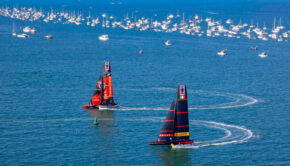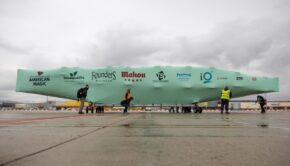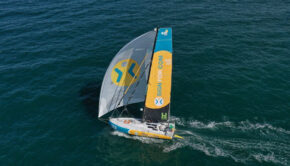Atlantic Cup Garners Environmental Achievements
Published on October 29th, 2016
The 2016 Atlantic Cup, a three stage 1045 nm event for Class40s, is equally committed to being environmentally sustainable. The 2016 race was the first sports event in the United States to be ISO 20121 compliant and the only event to be awarded Platinum Level Clean Regattas Certification from Sailors for the Sea.
“The Atlantic Cup is a unique event in both concept and execution,” reports Rob MacMillan, 11th Hour Racing Co-Founder and Advisor. “It demonstrates what can be achieved with environmental responsibility in mind at the inception. 11th Hour Racing is proud of this partnership, and this level of achievement sets the standard for other events to follow.”
ISO 20121 is a management system standard that was designed to assist event-oriented organizations improve the sustainability of their activities and productions. The international version of the standard was developed for the London 2012 Olympics.
ISO 20121 describes the layout of a management system that can help any event related organization to: reduce its environmental footprint and become more socially responsible, while maintaining the viability of the event.
It was the fifth time the Atlantic Cup has been awarded Platinum Level Clean Regattas Certification from Sailors for the Sea. Sailors for the Sea’s Clean Regatta program outlines 25 best practices, and Platinum Level is when an event engages in all 25 suggested best practices.
“Tracking the sustainability initiatives for the Atlantic Cup is a challenging endeavor due to the mobile nature of the race,” said Brian Funk, the Atlantic Cup’s Sustainability Director. “The combination of offshore racing and land based events makes for a unique dynamic in ensuring we were meeting our internal goal of being the most sustainable sailing race in the United States”
For the first time in its five-year history, the race had a robust waste management plan, which resulted in 88% landfill diversion rate, with 538 lbs of compost, 394 lbs of recycling and 139 lbs of trash sent to a landfill.
The Atlantic Cup has been single-use plastic water bottle free since its inception in 2011, estimating that the 2016 race prevented the use of 8,520 plastic water bottles. Also, 875 students across three cities received education in ocean health and environmental responsibility.
About The Atlantic Cup 2016:
The Atlantic Cup presented by 11th Hour Racing is, at 1,045 nautical miles, the longest offshore in the Western Atlantic. The Atlantic Cup was created and is owned by Manuka Sports Event Management. It started in 2011 as a concept event and grew to a multi-stage race. Since its inception, the Atlantic Cup has aimed to be the most environmentally responsible sailing race in the United States. The race is sailed solely in Class40s, a monohull race boat designed for shorthanded racing.
The first doublehanded leg started May 28 and took the fleet 648 nm from Charleston, SC to Brooklyn, NY, with the second doublehanded leg starting June 4 for 360 nm to Portland, ME. The final stage on June 10-11 had 6-person teams complete an inshore series of races in Portland.
The Atlantic Cup ran annually in May from 2011 through 2014. After 2014, the race moved to a biennial event. The course in 2011 was a sprint from New York to Newport with an inshore series in Newport. From 2012-2014, the race was a three-stage event that started in Charleston, South Carolina included a stop-over in New York City and finished in Newport, Rhode Island. In 2016, the Atlantic Cup had stop-overs in Charleston, S.C., Brooklyn, N.Y., and for the first time, Portland, Maine.
Source: The Atlantic Cup










 We’ll keep your information safe.
We’ll keep your information safe.